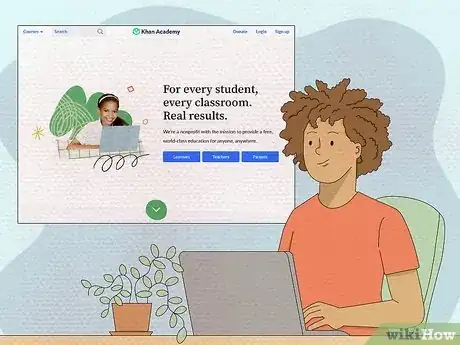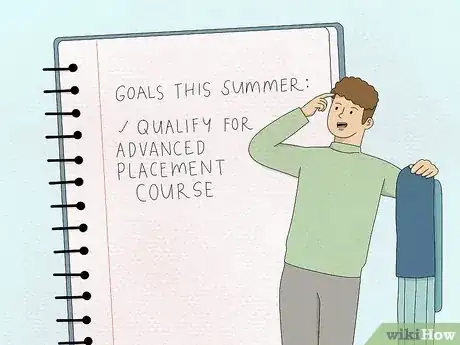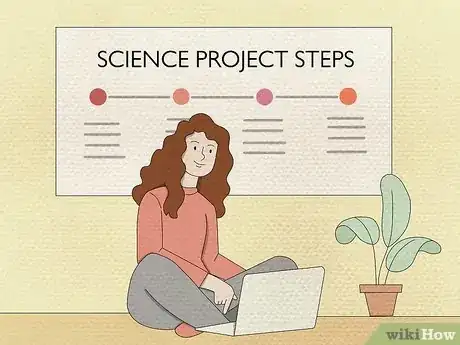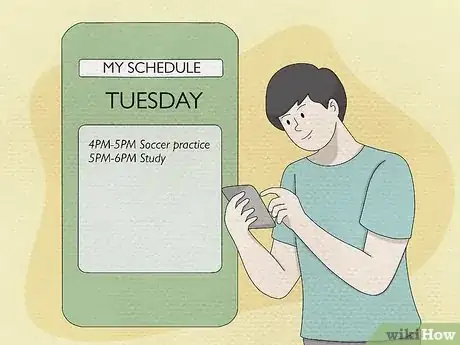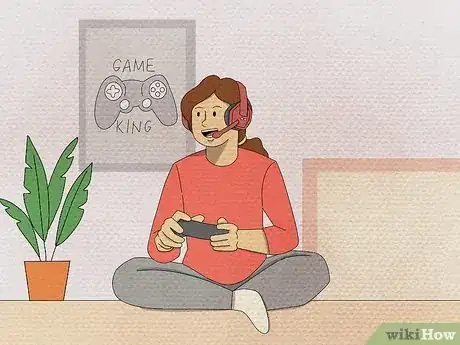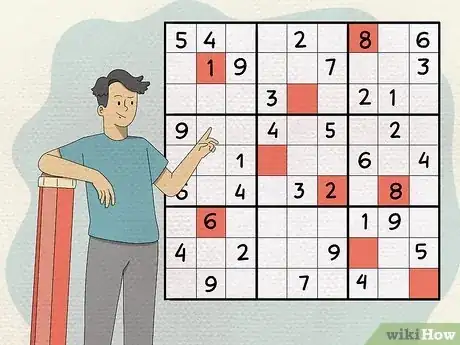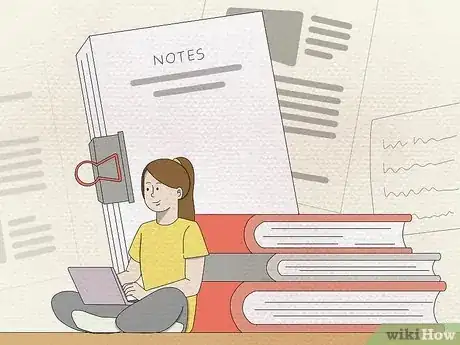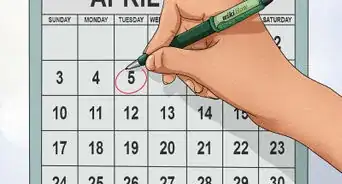This article was co-authored by Josh Jones. Josh Jones is the CEO and Founder of Test Prep Unlimited, a GMAT prep tutoring service. Josh built the world's first and only score guarantee program for private GMAT tutoring. He has presented at the QS World MBA Tour and designed math curricula for Chicago Public Schools. He has over 15 years of private tutoring and classroom teaching experience and a BA in Math from the University of Chicago.
There are 13 references cited in this article, which can be found at the bottom of the page.
This article has been viewed 64,688 times.
You work really hard in school all year and deserve a break in the summer. But it's really important to remember what you've worked so hard to learn during the year. It's also important to keep your brain in gear. Don't worry! You can enjoy your summer and still set aside some time for learning. It all comes down to organizing and motivating yourself, finding ways to keep your brain active, and having fun while you learn.
Steps
Doing Educational Activities
-
1Read a lot. Keep your brain alert by reading every day. This is the most important thing you can do to keep up for school next year. Choose books that you want to read so you'll stay motivated.[1]
- If you have required reading, break it up with fun reading.
- Read at the beach, the pool, or the park.
-
2Go on field trips. Switch up your summer learning by visiting museums, historical sites, aquariums, and zoos. Take in a play or a classical music concert. Increase your learning by reading signs, explanations, and playbills.Advertisement
-
3Volunteer. Try to find a volunteer tutoring position -- you'll understand subjects better if you need to explain them clearly. Look for a volunteer position related to your career goals, like with the police department or in the library. You'll learn about your future career and be learning relevant skills.[2]
-
4Tap into sources for educational activities. Consult your school's website to see if there are recommended websites for working on math, science, or reading. Talk to your teachers about websites or apps they recommend for studying over the summer. Check out the American Library Association lists of best websites for teaching and learning.[3]
- Look into Khan Academy if you're in middle or high school and PBS Kids if you're in elementary school.
- Find a website for practicing your typing skills, like Typing Club[4] .
Motivating Yourself
-
1Set some goals. Consult the list of things you want to review and think about what else you might want to learn this summer. Write down what you hope to achieve, like memorizing the periodic table. Keep your goals realistic and think about what you can really accomplish, like reading five required books.
- List the number of books you want to read this summer.
- Motivate yourself by writing down why you need to accomplish that goal, like qualifying for an advanced placement course.
-
2Break your goals down into manageable chunks. Outline specific things you can accomplish each week. Be realistic and think about what you really can accomplish each week, like reading two chapters of a book and doing 10 math problems. For example, you might want to learn 13 elements and their atomic numbers each week.[5]
- If you plan to do a science or technology project, list the minimum number of steps you need to do each week.
-
3Make a schedule.[6] Pick a few hours each week that you will set aside to study. Write these on your electronic or paper calendar. Schedule your studying around your fun activities, like sports practice. Scheduling fun first will motivate you.[7]
- List your weekly goals on each Sunday so you can refer back to them during the week.
-
4Reward yourself. Look at your goals and choose a way to reward yourself for achieving each of them. Talk to your parents about rewards they might give you for hitting your goals. For example, you might give yourself a manicure after you make your goals each week or ask your parents if you can spend extra time out with friends.
- Sometimes, it's good for you just to take a day off from studying so you can revisit it with a fresh mindset.[8]
-
5Make dates to study with your friends. Even if you're learning different things, doing it together will give you extra incentive to do your work. Try doing a science or technology project together, like coding a game. Or you could form a book club where you discuss required books together.[9]
- Add delicious snacks to your joint study sessions as extra motivation.
- Plan study activities in the park or meet for your book club on the beach or in a cafe. You don't have to study inside in the summer!
Keeping Your Skills Sharp
-
1Plan a trip. Ask your parents if you can plan a family vacation. Research locations and present them to your family. Next, ask your parents about a budget. Plan your hotels, travel, and itinerary to fit the budget.[10]
- Travel to a place where they speak a foreign language you study. You'll be more confident when you go back to school and your vocabulary and conversation skills will be better.
-
2Watch TV and go to the movies. Examine how books have been adapted to movies or TV shows to use your analytical skills. Or just watch adaptations of great works of literature. Keep up with the news to prepare for discussing current events in the coming school year. Studying current events will also keep your mind active over the summer.[11]
- Check out interesting lectures on TED Talks on topics you're studying in school.
-
3Play games. Get a Scrabble set or play Words with Friends to keep your vocabulary sharp. Play Monopoly, Set, Blokus, Racko, and Yahtzee to work on math and logic skills. Do jigsaw puzzles to work on your spatial and pattern-recognition skills.[12]
-
4Research and plan a project. Create a website, learn to cook, build a model airplane, or conduct some science experiments. Ask your parents about redesigning your room or garden. You'll improve your research skills, and many projects will also involve math and reading comprehension.
Organizing Yourself
-
1Talk to your teachers. Find out key information, like what you will be doing when you return to school. Ask for summer reading lists or practice math problems. Speak to your teachers and school librarian about good websites for learning about science, history, and other subjects over the summer.
-
2Get the syllabi. Ask your teacher or school counselor for the next year's syllabi. Also ask for lists of textbooks or other materials that will be used. You don't need to start reading the textbooks over the summer, but you can look through them to see topics that you might like to learn about in advance.
-
3Organize your notes. Don't look at your notes right away. Give yourself a few weeks to clear your head and rest from the stress of the school year. When you're ready, take a day or two to sort your notes and put them in order. Skim them while you organize as a way to review from last year. Type up anything that you think will be helpful for future courses and as a way to review them more intensively.[13]
-
4Don't worry if you didn't save your notes. Focus on other ways to keep learning over the summer, like reading a lot of books. The best thing you can do in the summer is to dedicate some time to academic-type activities. For example, you can work on your creative writing.[14]
- If you do want to review, borrow notes from your friends.
- You can also go online if your teacher posted material on your school or class websites.
-
5Make a comprehensive list of what you need to review. Make a list of the things that gave you trouble in the past year, like quadratic equations or history.[15] Plan how you'll review those things, like using math websites for homeschooled students or reading books about history. Add information that you learned from consulting your teachers or the syllabi to your list.
- If you were in a class that didn't finish the curriculum and you need that information for next year, like subjunctive verb tenses in a language class, add those to your review list.
Expert Q&A
Did you know you can get expert answers for this article?
Unlock expert answers by supporting wikiHow
-
QuestionWhat should I study over summer vacation?
 Josh JonesJosh Jones is the CEO and Founder of Test Prep Unlimited, a GMAT prep tutoring service. Josh built the world's first and only score guarantee program for private GMAT tutoring. He has presented at the QS World MBA Tour and designed math curricula for Chicago Public Schools. He has over 15 years of private tutoring and classroom teaching experience and a BA in Math from the University of Chicago.
Josh JonesJosh Jones is the CEO and Founder of Test Prep Unlimited, a GMAT prep tutoring service. Josh built the world's first and only score guarantee program for private GMAT tutoring. He has presented at the QS World MBA Tour and designed math curricula for Chicago Public Schools. He has over 15 years of private tutoring and classroom teaching experience and a BA in Math from the University of Chicago.
Academic Tutor
-
QuestionWhat if your teacher cannot help you prepare and you don't have books to read?
 Community AnswerTalk to your parents about joining the library, so you can find some books to read. You can also read the newspaper and watch the news on TV to keep up with current events. You can find some educational websites for practicing your math skills and learning about history, science, and other subjects.
Community AnswerTalk to your parents about joining the library, so you can find some books to read. You can also read the newspaper and watch the news on TV to keep up with current events. You can find some educational websites for practicing your math skills and learning about history, science, and other subjects. -
QuestionHow can I focus on studying when it's hot?
 Community AnswerTry studying in the morning when it's cooler. Break up your study time so it's not very long every day, especially when it's very hot outside. Go to study at the public library, where there might be air conditioning. Definitely drink lots of cold water when you're studying.
Community AnswerTry studying in the morning when it's cooler. Break up your study time so it's not very long every day, especially when it's very hot outside. Go to study at the public library, where there might be air conditioning. Definitely drink lots of cold water when you're studying.
References
- ↑ https://blog.ed.gov/2011/08/why-summer-reading-pays-off-year-round/
- ↑ http://www.greatschools.org/gk/articles/youth-summer-camp-teen-tween/
- ↑ http://gws.ala.org/category/sites-parents-caregivers-teachers-others
- ↑ https://www.typingclub.com/
- ↑ https://www.openpolytechnic.ac.nz/current-students/study-tips-and-techniques/study-tips/how-goal-setting-helps-your-study/
- ↑ Josh Jones. Academic Tutor. Expert Interview. 15 November 2019.
- ↑ http://time.com/3906983/summer-sat-study-tips/
- ↑ Josh Jones. Academic Tutor. Expert Interview. 15 November 2019.
- ↑ https://www.tucsoncollege.edu/blog/how-to-stay-motivated-during-the-summer/
- ↑ https://learning.blogs.nytimes.com/2012/04/25/these-days-are-numbered-eight-summer-math-ideas/comment-page-1/?_r=0
- ↑ http://www.educationworld.com/a_curr/curr084.shtml
- ↑ http://www.gse.harvard.edu/news/uk/16/06/summer-math-loss
- ↑ https://www.oxford-royale.co.uk/articles/study-summer-holidays.html
- ↑ https://www.edutopia.org/blog/7-ways-prevent-summer-learning-loss-barbara-dianis
- ↑ Josh Jones. Academic Tutor. Expert Interview. 15 November 2019.
About This Article
Summer break should be fun and relaxing, but it's also a great time to get ahead on your studying. Focus on things you struggled with last year so you won’t be confused next year. Type up any notes you think will be useful for next year on a computer to refresh yourself. Get a head-start on your work by reading books and doing research on topics you'll be covering next year. You can also set weekly goals to help yourself stay motivated, like reading a few chapters of a book or writing up notes on a topic. Don't forget to reward yourself after each goal by doing something fun. This will give you a good balance of work and play. For more tips, including how to do fun educational activities during the summer, read on!



